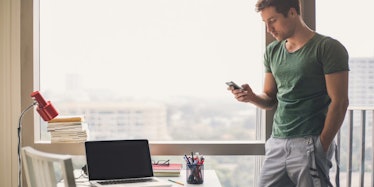
Why Spending Less Time On Your Work Can Actually Make You More Efficient
If there’s one thing I’ve taken from "Seinfeld" character George Costanza's book (and I’ve taken many things), it’s his approach to productivity in the workplace.
Granted, Costanza’s at-work habits may seem subpar, to say the least. I mean, he pretends to look annoyed at work so that he can fool the people around him into thinking he's busy. And he sets up a makeshift bed -- under his f*cking desk -- so that he can nap.
But Costanza ultimately does these things with one important goal in mind: avoiding stress, by all means necessary.
While I might not have a jacquard blanket or throw pillows under my desk, I definitely share George’s sentiment. I'm not about avoiding work, but I am about boosting productivity. And stress management is key.
Being efficient is not always as simple as putting your head down and just getting to work. There’s a lot more that goes into it. And different things work for different people.
Some people get through the work day on espresso shots and a fast pace. That kind of schedule can make other people's heads spin.
Like George (and like me), others thrive in a relaxing work environment.
These people prefer quiet workrooms over high-intensity boarding meetings. Instead of working to a deadline, they'd rather work until they feel satisfied.
And these methods aren't any less efficient than the first.
Victor Lipman, a business writer, defends employees who have Type B personalities -- and who display those personalities in the workplace. He argues that he's seen first-hand the benefits of a relaxed work environment.
Improving stress-management skills, Lipman says, will increase your productivity.
If your work is making you feel stressed, it’s unlikely that you’re going to wake up one morning feeling different. Your stress won't magically solve itself. And over time, it will negatively affect the people around you. It will become toxic. The people who work at your table or in the next cubicle will respond to your anxiety.
When workers are stressed out, “everyone in their immediate orbit feels it,” Lipman writes, “and the simple fact is people don’t do their best work while anxious.”
Anxiety is distracting. It makes you spend a lot of time wondering how to be less anxious -- not focusing on solutions. Anxiety can throw you into a spiral of self-doubt. You'll be angry with yourself for being anxious in the first place, and then you'll be frustrated that your worries are eating away so much of your day. If your pace is making you sick from stress, you won't be efficient.
So take a step back from your work. Catch your breath. Although it may seem counterintuitive to distance yourself from some project you need to be working on, it might pay off in the long run.
And if you have to sacrifice a night of half-assed work for one good night of sleep (so you can finally hit your stride the next day), it will probably be worth it.
Over time, stress tends to build up, especially when you’re trying to do too much at work. Crunching for deadlines and cranking out long hours may seem like the proper way to approach a heavy workload, but Lipman warns that “a chronically stress-packed management style breeds burnout and turnover."
When stress builds, employees feel less engaged. As Karen Higginbottom writes in Forbes, “the Global Benefits Attitudes survey found that levels of workplace disengagement significantly increase when employees experience high levels of stress.”
And the biggest reason for stress in the American workplace? That would be a “lack of work-life balance,” according to Higginbottom. Focusing on de-stressing outside of work is as important as de-stressing in the office.
Plan your downtime accordingly. Focus on hobbies that will give your mind a break. Get an adequate amount of sleep. Exercise more. Make some time for Netflix (but not too much time). Cook a meal with your family. Create non-work projects that will make you proud.
All of these things can leave you feeling more refreshed and less pressured at work.
Ultimately, it’s not always about how much you work, or even how intensely; it’s about working the most efficiently.
In order to work more productively, you need to relax (as silly as that sounds).
While stress may be what gets you off the couch, it's not sustainable in the long run.
Pay attention to what works best for you; pursue that in your own career. As long as the job gets done, the "how" doesn't matter. Most creative people have their own unique process, so don’t sweat it if you work best under conditions that seem avant-garde.
Just take a deep breath. Your work will benefit.